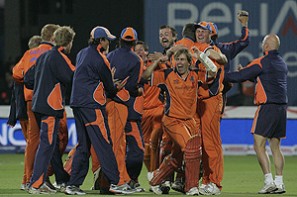The possibiliy of Jofra Archer's career coming to an early end will rob cricket of a bowler with so much talent
While a premature retirement isn’t the solution, he or England want, he may be forced into it if he can’t maintain a long run of matches.

It was a great day to be Dutch, and a terrible day to be English if you were a cricket fan on the 31st March 2014.
The Dutch, after posting a competitive 133-5, managed to bowl a sub-par England out for just 88, in one of the biggest shocks in the history of world cricket.
It’s been nearly two years since this remarkable result, and none have happened since. These kind of results don’t happen very often because of the ICC, and the way cricket is structured.
The World Twenty20 draw demonstrates this perfectly. The six qualifying nations, along with Bangladesh and Zimbabwe, will have to play in groups of their own before meeting any of the top eight teams in the world.
Only two of these teams will qualify into the groups containing the main full member nations, leaving the possibility for upset and unpredictability in the tournament fairly low.
It’s highly unlikely for instance that we’ll see another showdown between the Netherlands and England, not unless both teams make it to the semi-finals at least.
But then it’s highly unlikely we’ll see any upsets at all in the tournaments, not major ones anyway. The way cricket is structured, the top eight teams in the world play each other on a regular basis, meaning the minnows are left to fight it out against each other.
While both sets get fixtures, the minnows are stuck playing each other, hardly getting a fixture against the big teams of the world, thus being starved of a chance to improve. Now while at the moment Australia playing the Netherlands would hardly be a contest, there is no appetite for the future in the ICC.
There is no one fighting the associate’s corner, stating the fact that if teams like Ireland or the Netherlands played England, Australia and Sri Lanka among others on a regular basis they might just get better.
It would do the game no harm to have some new and upcoming international teams that are actually starting to beat the major powers. Ireland and the Netherlands particularly have been on the cusp of this for years, but because of the lack of fixtures available, they are only able to truly test their mettle at the big international tournaments.
Irish batsman Kevin O’Brien commented at the 2015 World Cup on the ICC’s proposals to limit the number of teams at the next World Cup to ten, asking why don’t the minnows just pack up and go home if they’re not going to get support from the governing body?
And why don’t they? If the ICC are giving the associate members less fixtures against the full members rather than more, the situation for the minnows is only going to get worse.